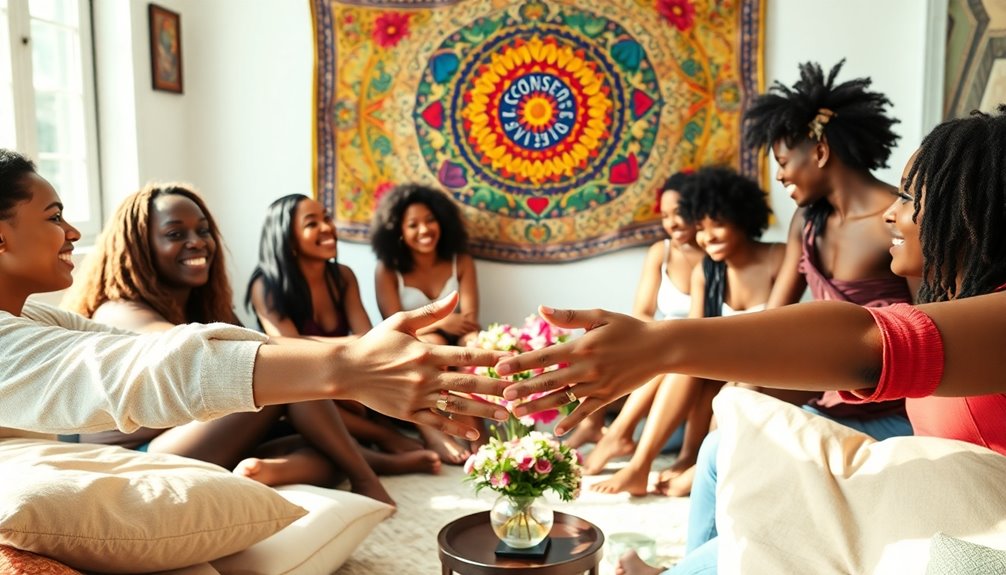Sex positivity is all about embracing a healthy, open attitude towards sexuality. It sees sexual expression as an essential part of being human. You're encouraged to explore your desires without fear of judgment, emphasizing the importance of informed consent and respectful communication. Sex positivity challenges societal stigmas, celebrating diverse sexual orientations and practices. It fosters a culture of acceptance and education, ensuring everyone has access to accurate information about sexual health and rights. If you're curious about the principles, history, and impact of this movement, you'll find even more insights waiting for you.
Key Takeaways
- Sex positivity embraces a healthy, shame-free view of sexuality as an essential aspect of humanity, promoting overall well-being.
- It emphasizes informed consent and respectful communication as foundational elements in all sexual interactions.
- The movement encourages exploring diverse sexual orientations and practices while challenging societal stigmas.
- Extensive sexuality education is vital for understanding sexual health, rights, and safe practices.
- Sex positivity fosters a culture of respect, acceptance, and autonomy in sexual expression for all individuals.
Definition of Sex Positivity

Sex positivity is all about embracing a healthy, shame-free view of sexuality as an important part of being human. The definition of sex positivity revolves around understanding sexuality as a natural aspect of life, promoting sexual liberation and well-being.
It emphasizes informed consent and respectful communication, encouraging you to explore your desires without fear of judgment. Extensive sex education plays a crucial role in this movement, equipping you with knowledge about sexual health and safe practices.
By recognizing and celebrating diverse sexual orientations, sex positivity actively challenges societal stigmas, opposing harmful narratives like slut-shaming and kink-shaming.
Ultimately, it empowers you to embrace your sexuality confidently, fostering a culture of respect and acceptance for all individuals.
Historical Background

Although often overlooked, the historical roots of sex positivity reveal a rich tapestry of social change and cultural evolution.
The term "sex positivity" was coined by Wilhelm Reich in the mid-20th century, emphasizing that sexual expression is a natural and healthy part of life.
The modern sex-positive movement gained momentum during the sexual revolution of the 1960s and 1970s, which championed sexual liberation, contraception access, and women's rights.
Influenced by feminist and LGBTQ+ rights movements, this approach fights against the stigmatization of diverse sexual practices and identities.
In 2002, the World Health Organization defined sexual health, emphasizing pleasure and safety, further legitimizing sex-positive principles.
Since the early 2000s, online platforms have enhanced the visibility and accessibility of sex-positive resources and communities.
Core Principles and Beliefs

Understanding the core principles and beliefs of sex positivity is vital for fostering a respectful and open dialogue about sexuality. At its heart, sex positivity emphasizes informed consent as a foundational aspect of all sexual interactions, ensuring everyone feels respected.
It champions open communication about desires and boundaries, which helps cultivate healthier relationships and diminishes stigma. Extensive sexuality education is essential, as it includes diverse sexual identities and equips you with knowledge about safe practices.
The movement recognizes sexual rights as fundamental human rights, advocating for autonomy and personal agency in sexual expression. Ultimately, it promotes the rejection of societal stigmas surrounding sexuality, encouraging acceptance of various practices, including BDSM and polyamory, to support healthy sexual expression.
Sex-Positive Feminism

Empowerment lies at the heart of sex-positive feminism, which emerged in the early 1980s as a bold response to anti-pornography feminism. This movement champions your sexual agency, advocating for your right to explore desires freely and without stigma.
It emphasizes personal choice in sexual expression, encouraging you to embrace your sexuality as a source of empowerment rather than viewing it through a lens of objectification. Key figures highlight the need for feminist perspectives that recognize both the liberating and potentially harmful aspects of sexuality.
Challenges and Critiques

As the sex-positive movement gains traction, it faces several challenges and critiques that warrant attention. You might notice that sex positivity varies across different contexts, often sidelining systemic issues affecting marginalized groups.
Here are three key critiques:
- Victim-blaming: Movements like SlutWalk aim to counter this, yet their effectiveness is debated, particularly for women of color.
- Harmful stereotypes: Critics argue that sex positivity can reinforce traditional views on sexuality, depicting women as passive and men as aggressive, complicating discussions around consent.
- Comprehensive sexual education: The backlash from conservative groups continues to obstruct acceptance of sex-positive principles, hindering efforts for inclusive and effective education.
These critiques encourage a more nuanced understanding of sex positivity's implications in society.
Cultural Representation

Cultural representation plays an essential role in shaping your understanding of sex positivity.
When celebrities advocate for body acceptance and openly discuss sexual health, it influences how you perceive these topics.
Additionally, media portrayals of diverse identities help normalize conversations around sexuality, making it easier for everyone to engage in meaningful discussions.
Media Portrayals of Sexuality
Over the past few decades, media portrayals of sexuality have transformed considerably, reflecting a broader acceptance of diverse sexual identities and practices. This evolution promotes sex positivity and encourages healthy relationships.
You might notice these key changes:
- Increased representation of sexual identities, allowing for greater visibility and understanding.
- Conversations around body acceptance and the reduction of stigma associated with sexual expression.
- The rise of online platforms fostering sex-positive communities that share educational content and personal stories.
Despite these advancements, some media still perpetuate harmful stereotypes, reminding us of the ongoing need for accurate and respectful representation of sexuality.
Celebrity Advocacy Impact
Celebrity advocacy plays an essential role in promoting sex positivity and reshaping societal attitudes toward sexuality. When figures like Jameela Jamil and Lena Dunham speak out about body acceptance, they challenge stigmas and inspire open discussions. Their candidness encourages younger audiences to embrace diverse sexual orientations without shame.
High-profile campaigns by Miley Cyrus and Emma Watson tackle significant topics like consent and sexual health, fostering a broader understanding of sex positivity in popular culture. In addition, representation of sex-positive narratives in mainstream media sparks conversations about inclusivity.
Representation of Marginalized Identities
While many discussions about sex positivity focus on mainstream narratives, it's important to include the representation of marginalized identities. Elevating voices from these communities not only enriches the conversation but also advocates for their sexual rights.
Here are three key areas to reflect on:
- Intersectionality: Recognizing how race, gender, and sexuality intersect helps address the unique challenges faced by marginalized identities.
- Body Acceptance: Representation in media promotes body acceptance and challenges societal norms surrounding beauty and desirability.
- Diverse Perspectives: Including LGBTQIA+ experiences enhances discussions around sexual health and education, ensuring all voices are heard.
The Role of Consent

Consent is fundamental to maneuvering sexual relationships, guaranteeing that all parties are not just willing but enthusiastic participants. Enthusiastic consent emphasizes clear, affirmative agreement, making informed consent imperative. Extensive sex education that includes consent can greatly reduce sexual violence and foster healthy relationships. It's essential for you to engage in ongoing communication about boundaries and desires, recognizing that consent is a dynamic process that can change.
| Type of Consent | Description | Importance |
|---|---|---|
| Informed Consent | Understanding the nature and risks of activity | Empowers individuals to make choices |
| Enthusiastic Consent | Active, clear, and voluntary agreement | Promotes engagement and excitement |
| Ongoing Communication | Continuous dialog about boundaries | Guarantees comfort and mutual respect |
| Revocable Consent | Ability to withdraw consent at any time | Protects individual autonomy |
| Extensive Education | Programs teaching consent and boundaries | Reduces sexual violence and misconceptions |
Education and Advocacy

Education and advocacy play an essential role in promoting sex positivity, as they equip individuals with the knowledge and resources necessary for healthy sexual experiences. Extensive sex education is fundamental, helping you understand sexual health, consent, and sexual rights.
Advocacy efforts actively combat stigma, allowing everyone to express their sexual identities freely. Here are three key components to reflect on:
- Open Communication: Encouraging discussions about sexual experiences fosters trust and understanding.
- Access to Resources: Organizations like Planned Parenthood provide critical information and services related to sexual health.
- Combating Misinformation: Ongoing education initiatives work to dispel myths, ensuring you're informed and empowered in your sexual decision-making.
Impact of Social Media

Social media's transformed how you access and engage with sex-positive communities and resources.
Influencers and educators are breaking down barriers, making conversations about sexual health and consent more relatable and accessible.
Online Communities and Resources
Online communities and social media have transformed how people engage with topics surrounding sexual health and identity. You can find essential resources that promote the sex-positive movement, fostering conversations about consent and safe sex practices.
Here are three ways these platforms support sexual wellness:
- Information Sharing: Hashtags like #SexPositive on Twitter and Instagram make educational content more accessible.
- Safe Spaces: Online forums such as Reddit's r/sex offer a platform to ask questions and share experiences without judgment.
- Campaigns: Social media campaigns raise awareness about body positivity and sexual health, reaching audiences beyond traditional settings.
These online communities empower you to explore your identity and enhance your understanding of sexual wellness in a supportive environment.
Influencers and Public Discourse
In recent years, countless influencers have taken to social media to reshape discussions around sexuality, making these conversations more accessible and relatable.
Influencers like Dr. Jess O'Reilly and Hannah Witton use platforms like Instagram and TikTok to educate you on consent, sexual health, and body positivity. Their efforts normalize sex positivity and challenge the stigma surrounding diverse sexual orientations.
Hashtags such as #SexPositive and #BodyPositivity further fuel this growing movement, allowing individuals to share their identities without shame.
Research shows that these online discussions greatly reduce feelings of isolation, especially in marginalized communities, leading to better mental health outcomes.
Social media plays an essential role in promoting open dialogue and fostering a supportive environment for all.
Future of Sex Positivity

As society evolves, the future of sex positivity is set to embrace more inclusive and thorough approaches to sexual education.
You'll see extensive sex education programs that focus on:
- Sexual Diversity: Addressing various sexual orientations and identities to guarantee everyone feels represented.
- Consent and Healthy Relationships: Emphasizing the importance of mutual respect and understanding within intimate connections.
- Intersectionality: Recognizing how cultural and social factors influence sexual experiences and rights.
This evolution will enhance public policy, making it more responsive to the complexities of sexual rights.
Advocates will push for greater visibility of sex-positive messages in popular culture, fostering open discussions and reducing stigma.
Organizations like Sexpression:UK will lead initiatives that counteract traditional sex-negative attitudes, enriching the sex positivity movement.
Frequently Asked Questions
How Do You Explain Sex Positivity?
To explain sex positivity, you focus on embracing open discussions about sexuality without shame.
You recognize that everyone has unique experiences and preferences, so you encourage mutual respect and consent in all interactions.
By promoting safe practices and informed choices, you empower yourself and others to explore sexuality freely.
Understanding that cultural attitudes can hinder expression, you advocate for inclusivity, ensuring everyone feels valued and respected in their sexual journeys.
What Does 🌶 Sex Positivity Mean?
When it comes to understanding sex positivity, you've got to recognize it's all about embracing the full spectrum of human sexuality.
It means you celebrate sexual expression as a natural part of life, where consent and mutual respect are key.
You'll challenge societal stigmas and advocate for thorough education that informs you about diverse orientations and practices.
Ultimately, it's about fostering healthier, more open conversations about sex, allowing everyone to feel accepted and empowered.
What Is Normal Sex Positivity?
Normal sex positivity means embracing open discussions about sexuality.
You acknowledge that all consensual sexual practices are valid and healthy. It's about prioritizing informed consent, ensuring everyone feels safe and respected.
You celebrate diverse sexual orientations and preferences, fostering an inclusive environment. Extensive sex education provides you with the necessary tools for safe experiences.
What Is the Opposite of Sex Positive?
Imagine living in a world where discussing sex feels like walking on eggshells. The opposite of being sex positive is sex negativity, which views sexual expression as shameful or harmful.
You might encounter beliefs that promote abstinence and discourage open conversations about desires and health. This mindset can lead to stigma, anxiety, and a sense of shame, ultimately affecting your mental well-being and relationships.
Embracing a healthier perspective is essential for personal growth and understanding.
Conclusion
In a world where sex positivity reigns supreme, imagine a universe where everyone celebrates their desires and embraces their bodies without shame. You've got the power to shatter taboos and ignite conversations, transforming awkward moments into empowering experiences. By championing consent and open dialogue, you're not just part of a movement; you're a revolutionary force! So, as you step into this vibrant domain, let your voice echo, and remember: your journey towards a sex-positive world starts now!










